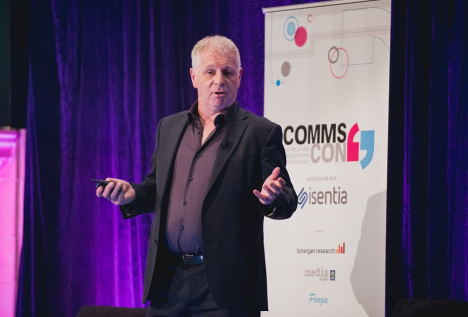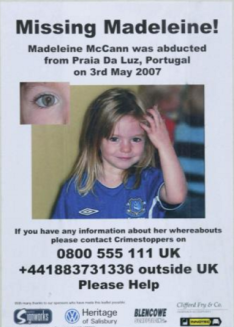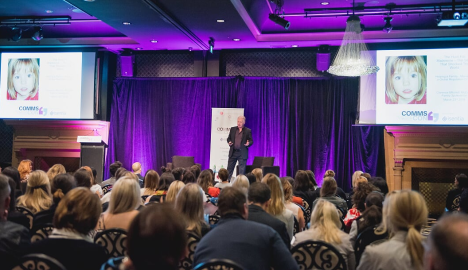Madeleine McCann family PR advisor said he had to ‘think like a journalist’ to keep the story in press for nine years
The man who has kept the disappearance of toddler Madeleine McCann in the news for the past nine years said he managed to do so by looking at the case through the eyes of a journalist.
Speaking on the challenges of dealing with what became one of the biggest news stories in the world at the time, Clarence Mitchell revealed to the CommsCon Conference in Sydney, it was “the first big missing child case of the internet age”.
Explaining how he handled the initial issues posed by a press pack of 3-400 international reporters, former BBC reporter Mitchell explained: “I had to look at it as a journalist would – pose the questions a journalist would ask. If you’re half-way to answering those questions you are half-way to getting good coverage.”
After the four-year-old was snatched from her hotel room at a Portuguese resort while her parents dined at a nearby restaurant, Mitchell said it became “like a daily soap opera” as it was “a story that shocked the world and continues to shock”, leading the media to bay for more headlines to feed public interest in the case.
He explained how turf wars developed between local and international press, and how he had had reporters in tears begging for extra information otherwise they ‘would be fired’, leading to stories containing “wild allegations” in the media against parents Kate and Jerry McCann.
Mitchell said the family were initially reluctant to go legal for fear of getting the press offside, but have ultimately taken action against several papers in the UK and Portugal, which Mitchell said: “Did set a marker, we were reluctant to go legal, and the British media calmed down and they have been a lot more responsible since then.”
The family has had more than 550,000 pounds in damages paid out to the foundation, which helps to fund the ongoing search for Madeleine.
Ultimately Mitchell said his job was to try and bring reporters back to the central message – the hunt for Madeleine – and “not the wider family soap opera which was developing around it”.
Asked how he had kept the story, which has had thousands of front page articles around the world, in the public attention, he explained: “We were aware early on there could be a boredom threshold with members of the public – as awful as that sounds.
“News desks did start to say they need something different, and that’s where the age-progressed images were important and gave us new hooks to create more interest in it.”
He said he avoided exclusivity with papers as “that would have backfired spectacularly” saying they key was to get as much publicity as possible.
“Later on, as the appetite began to wane on a daily basis we had to be a bit more imaginative”, pointing to a segment on the second anniversary on the Oprah Winfrey show which showed how they produce the age-progressed images of Madeleine. He added they also insist on campaign materials being used in every story about Madeleine.
“For something that’s running as an ongoing issue you need everyone on board,” he added.
Explaining how he approached working with journalists, he explained: “A legitimate tier-one journalist, if they have a good relationship with you, will hear you out, it doesn’t mean they will change their story, but they will give you a fair hearing.”
He also explained how “there’s too little investigative journalism” as “a lot of news desks have turned into cut-and-paste because of the constant monster of the internet”.
“If I knew the journalists and they knew me and I could say here’s the truth of the situation then they’d give me a fair hearing.”
But he warned: “There’s no such thing as ‘off the record’ any more. If you don’t want to see it in print and on the air, don’t say it.
“I would ask understanding as to why we couldn’t get into that today, but it will become clear. Or I’d say ‘if you don’t print that today, I’m promising you you will have something better on Friday’.
“That worked with media I knew. With the Portuguese media I didn’t know from Adam I had to be more careful.”
Alex Hayes




